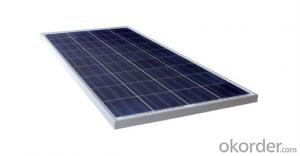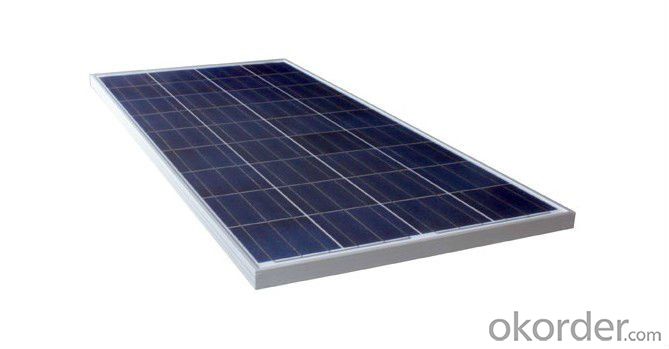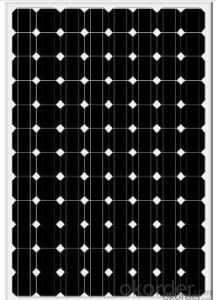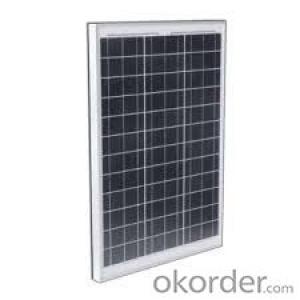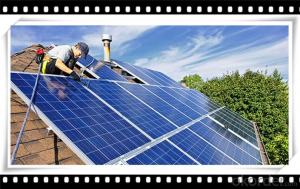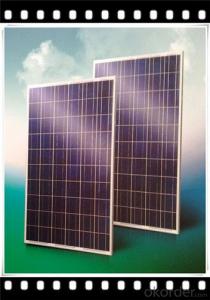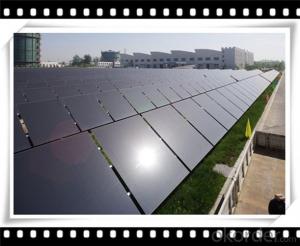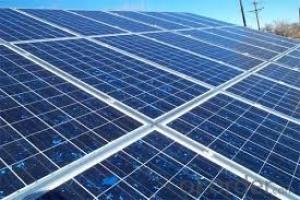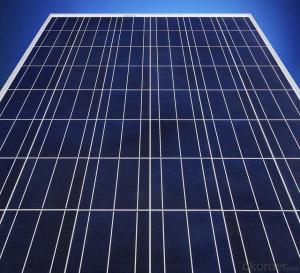70w Poly Solar Panel Home Small Poly Solar Panel CNBM Sun Following Solar Panels
- Loading Port:
- Qingdao
- Payment Terms:
- TT OR LC
- Min Order Qty:
- 10 set
- Supply Capability:
- 300000 set/month
OKorder Service Pledge
OKorder Financial Service
You Might Also Like
Polycrystalline Solar Modules
CNBM offers a range of small, medium and large polycrystalline solar modules, designed for a range of requirements.
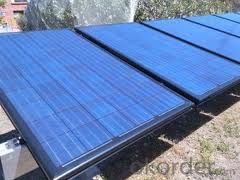
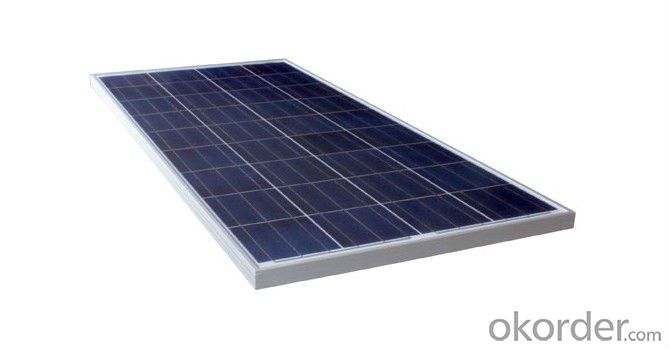
Specifications:
Tolerance | +/-3% |
Cell | Polycrystalline silicon solar cells (156 x 156mm) |
N0. of Cells | 60 (10 x 6) |
Dimension of Modules (mm) | 1650 x 990 x 40 |
Weight (kg) | 25.5 |
Limits:
Operating Temperature | -40~+85? |
Storage Temperature | -40~+85? |
Maximum System Voltage | 1000 VDC max. |
Hail Impact | Diameter of 28mm with impact speed |
Temperature and Coefficients:
NOCT | 48C+/-2? |
Voltage temperature coefficient (%/K) | -0.35 |
Current temperature coefficient (%/K) | 0.05 |
Power temperature coefficient (%/K) | -0.45 |
Characteristics:
Model: | SGM-200P | SGM-210P | SGM-220P |
Max-power voltage Vmp (V) | 29.2 | 29.4 | 29.41 |
Max-power current Imp (A) | 6.85 | 7.14 | 7.48 |
Open-circuit voltage Voc (V) | 36.5 | 36.69 | 36.9 |
Short-Circuit Current Isc (A) | 7.28 | 7.6 | 7.93 |
Max-power Pm(W) | 200 | 210 | 220 |
Model: | SGM-230P |
Max-power voltage Vmp (V) | 29.8 |
Max-power current Imp (A) | 7.72 |
Open-circuit voltage Voc (V) | 37.31 |
Short-Circuit Current Isc (A) | 8.19 |
Max-power Pm(W) | 230 |
STC: Irradiance 1000W/m2, module temperature 25?, AM-=1.5
Poly Crystalline Solar Panels Specifications Range
Maximum Power (Pm) | Dimension | Weight | Operating Voltage (Vmp) | Operating Current (Imp) | Open Circuit Voltage (Voc) | Short Circuit Current (Isc) |
0.45W | 140x80x10mm | 0.08kg | 3.3V | 150mA | 4.6V | 160mA |
1.0W | 162x140x10mm | 0.16kg | 7.5V | 150mA | 10.3V | 160mA |
4.5W | 269x251x23mm | 0.8kg | 16.5V | 0.27A | 20.5V | 0.3A |
10W | 420.1×268.9×22.6mm | 1.92kg | 17.5V | 0.58A | 20.5V | 0.6A |
20W | 425x502x50mm | 3.0kg | 16.8V | 1.19A | 21.0V | 1.29A |
30W | 593x502x22.6mm | 3.9kg | 16.8V | 1.78A | 21.0V | 1.94A |
40W | 655x537x50mm | 5.75kg | 17.3V | 2.31A | 22.1V | 2.54A |
50W | 839x537x50mm | 6.0kg | 17.5V | 2.9A | 21.8V | 3.17A |
65W | 1111x502x50mm | 7.2kg | 17.6V | 3.69A | 22.1V | 3.99A |
80W | 1204x537x50mm | 7.7kg | 17.6V | 4.55A | 22.1V | 4.8A |
- Q: The voltage and power problems of solar panels
- From morning to night (with sunshine) solar panel voltage is generally relatively stable, that is basically about 30V; but the output power is always changing, sooner or later, noon; if it is good quality solar energy,
- Q: I recently got into solar panels, I have little background in electronics but I have done a little electrical work in the past and just want to make a small 36 cell panel to power a 2v battery that would run my a small tv (9 inch) and PS3 for a few hours every night. I have been looking up on how to do it before I get in over my head and I have a few questions.... After you solder all of the cells together then what? Do you hook all of the rows of cells together somehow? Can you connect them straight to a battery? After you hook to the battery do you hook up a power inverter to get the 2 AC plugs that would be needed? Thanks in advance for any help....
- You will have to wire them in such a way that provides the battery with the optimal voltage for it to charge, which on a car 2v battery is around 4v. You said you have some background in electronics so this shouldnt be too difficult. You can connect them straight to the battery yes. Like you said, I believe a power inverter from 2VDC to 0VAC would work just fine. PS3 pulls a lot lot lot of current though so it probably wouldnt last too long. Look up the specs for PS3 and see how many amps it is pulling and purchase your inverter based off of that. I remember trying to run an xbox in my car one time and the inverter I had didnt work because of that. Be careful working with batteries, I had one explode in my face about a month ago.. scariest moment of my life! Good luck!
- Q: Can solar panels be installed on a canopy or pergola?
- Yes, solar panels can be installed on a canopy or pergola. In fact, these structures can provide an ideal location for solar panel installation as they are often situated in areas with good sun exposure. By placing solar panels on canopies or pergolas, you can maximize the use of available space while also providing shade and protection from the elements.
- Q: Could anybody give some review about Homemade Solar Panel.
- If you want to make hot water then they are easy to make. Search the web.
- Q: Solar panels single crystal and double crystal in the rain which is easy to use
- Polycrystalline silicon solar cell production process and monocrystalline silicon solar cell almost, but the polysilicon solar cell photoelectric conversion efficiency will have to reduce a lot of its photoelectric conversion efficiency of about 12% (July 1, 2004 Japan Sharp market efficiency of 14.8% Of the world 's most efficient polysilicon solar cells).
- Q: I am writing some mock legislation for a school club and I need to know some of the environmental effects of solar panels. Also, where can I find specific studies(like from colleges and/or universities) proving these benefits as well as benefits and reasons of going green.
- Hi there, as a great starting point take a look here okorder Should give you most of what you require
- Q: The colder a solar panel gets the more efficient it seems to be. As the panel warms, it loses some efficiency. Why is this so? Please explain in a way you would expect a high school kid to understand it, as I am a high-schooler and i have to explain this to other high-schoolers.
- Absolutely temperature matters. So what do higher temperatures do to solar photovoltaic panels? As temperatures rise, the efficiency of solar panels decreases. Heat causes electrical resistance to the flow of electrons. On days where the temperature is more than 75 degrees, the electrical resistance makes the voltage fall thereby producing less kilowatts per hour. Your roof is much hotter than temperatures on the ground. That’s why solar panels are not mounted flat to a roof. There’s usually a few inches of spaces between the panels and roof so air flow can easily pass through and cool the panels down. There are some photovoltaic panels that are designed specifically to operate in hotter temperatures. These panels have a higher temperature coefficient. This is especially important in high heat climates like Arizona or New Mexico, but probably wouldn’t make too much of a difference in New England (except maybe this year). If someone lives in one of these areas, they should speak to a solar installer to make sure they are using they right equipment for their region. Please note: Solar thermal panels used to heat water can withstand high temperatures without any degradation. In fact, hotter temperatures would actually be better for these types of modules.
- Q: Can solar panels be installed on mountain huts or lodges?
- Yes, solar panels can be installed on mountain huts or lodges. In fact, mountain huts and lodges are often great locations for solar panel installations due to their high elevation and exposure to sunlight. Solar panels can provide a reliable and sustainable source of electricity in remote mountainous areas, reducing reliance on traditional power sources and minimizing environmental impact.
- Q: Can solar panels be used in areas with high levels of noise from transportation?
- Yes, solar panels can be used in areas with high levels of noise from transportation. Noise pollution does not directly affect the functionality of solar panels as they primarily rely on sunlight to generate electricity. However, it is important to ensure that the installation of solar panels is done properly to avoid any physical damage caused by vibrations or other factors associated with transportation noise.
- Q: Do LED lamps ever go bad?What's the life expectancy of solar panels?
- LEDs last approximately 50,000 hours of operation, continuous or non-continuous, it doesn't matter. 50,000 hours. Solar panels will, theoretically, last until the end of time. The support structures will fail long before the panels themselves. Inverters, battery banks, op-amps, transformers, control boards, etc. will all fail long before a solar panel stops making juice.
Send your message to us
70w Poly Solar Panel Home Small Poly Solar Panel CNBM Sun Following Solar Panels
- Loading Port:
- Qingdao
- Payment Terms:
- TT OR LC
- Min Order Qty:
- 10 set
- Supply Capability:
- 300000 set/month
OKorder Service Pledge
OKorder Financial Service
Similar products
Hot products
Hot Searches
Related keywords
